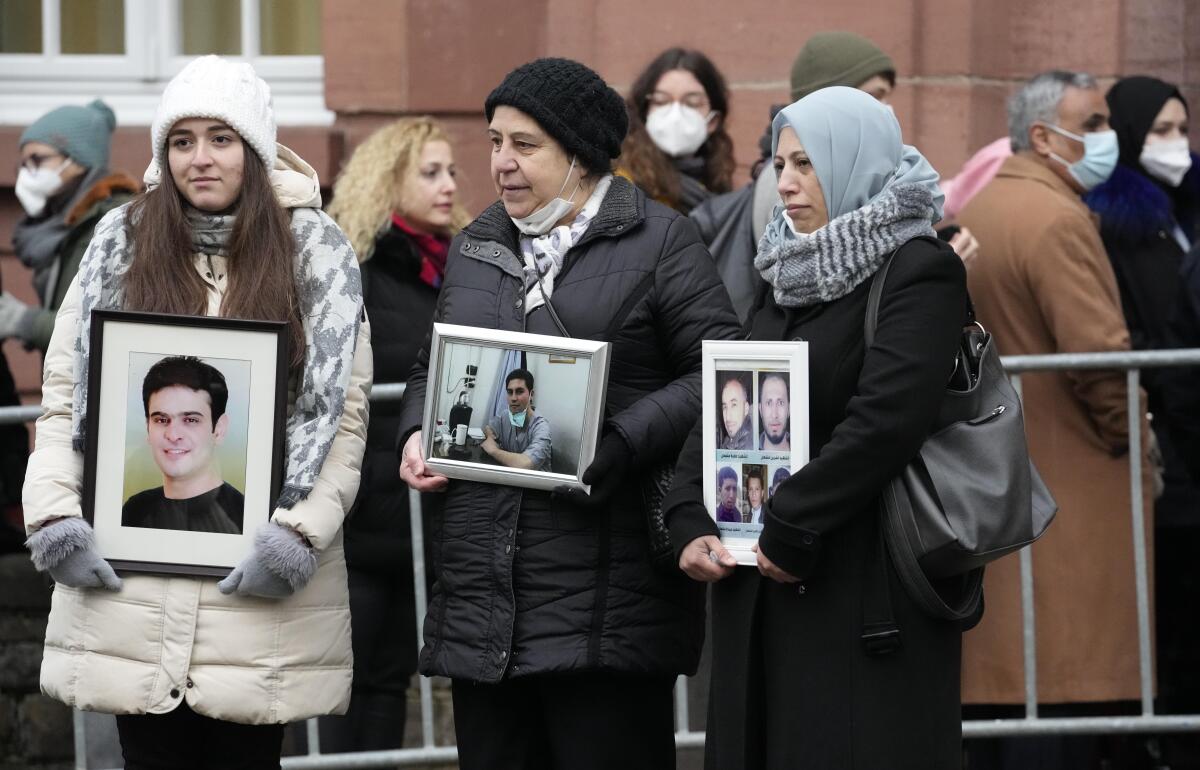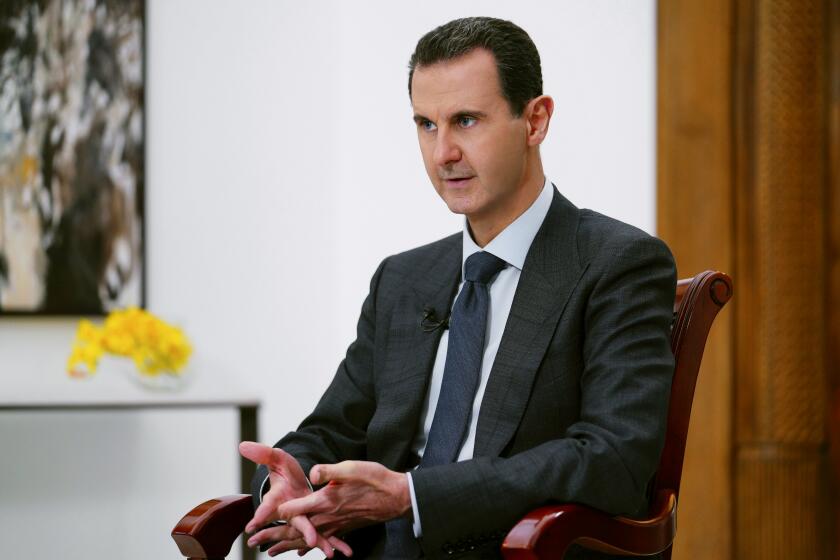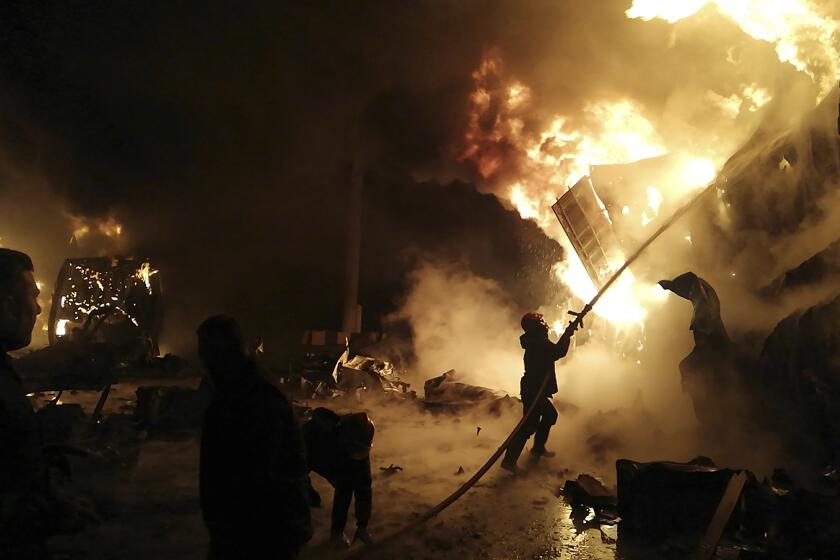Former Syrian intelligence officer convicted for crimes against humanity

- Share via
BEIRUT — In what was seen as a watershed moment in the fight for accountability in Syria’s war, a German court convicted a former Syrian intelligence officer on Thursday of carrying out crimes against humanity while heading a detention center in Damascus. The decision wrapped up what activists and human rights advocates say is a landmark trial over systematic torture perpetrated by Syria’s government.
Anwar Raslan, a 58-year-old colonel in the Syrian state security apparatus who worked in the Branch 251 detention center during 2011 and 2012, was handed a life sentence in prison by a court in the German city of Koblenz.
It was the second conviction of a Syrian government official for crimes against humanity. Almost one year ago, the same court sentenced Eyad Gharib, an underling of Raslan, to 4 ½ years in prison. The two mean were arrested in February 2019; Raslan came to Germany as a refugee in 2014 after having escaped Syria in 2012. German prosecutors tried them under the principle of universal jurisdiction, which holds that national courts can have jurisdiction over crimes against international law even if they take place outside the country’s territory.
“It’s an important day for us, and I’ve been looking forward to it because for us and other Syrians, this is the day where there is a clear sentence,” said plaintiff Wassim Mukdad, a Syrian musician who had been interrogated in Branch 251, “that torture and crimes committed in the prison of the regime are methodical and systematic and not individual cases.”
In a measure of the trial’s significance, crowds began to line up early Thursday morning to gain entry to the courthouse in Koblenz, a tiny city on the Rhine. When the verdict was announced, a television broadcast from inside the court depicted Raslan hunched over and hiding his face behind a drab gray garment draped over his head.
“For the first time, a higher-ranking member of the Syrian regime has been convicted of crimes against humanity — also thanks to the tireless work of many activists and NGOs,” said Patrick Kroker, a representative for the plaintiffs and a lawyer with the European Center for Constitutional and Human Rights.
“The verdict today is only a first step in addressing the crimes in Syria — but this first step is often the most difficult.”
Syrian President Bashar Assad has been sworn in for a fourth seven-year term in the war-torn country.
The trial’s conclusion comes amid a slow-roll move toward normalization with Syria, where President Bashar Assad remains firmly in power even as the war has stalemated into low-level simmer. In recent months, countries in the region have re-established links with Damascus, and there have been growing calls for Syria to rejoin the Arab League.
With little hope of dislodging Assad and his government, the president’s adversaries have instead resorted to European courts to hold war criminals accountable in a conflict that was at its height a charnel house: Government airstrikes, indiscriminate shelling and brutal ground incursions killed hundreds of thousands of people, reduced millions more to refugees and turned the country’s name into a synonym for misery.
But Raslan’s trial is more about how it began. In 2011,when the fervor of the Arab Spring revolutions in Tunisia and Egypt reached Syria, protests bloomed all over the country against the government, the Assad dynasty and the cronyism that had beggared the nation to the benefit of far too few. Assad vowed to retaliate.
Girding that retaliation was a network of Stasi-esque security services, whose cadres rounded up protesters by the hundreds and dumped them in what the plaintiffs said was an interrogation and torture machine of an almost industrial scale, including at Branch 251, which is known as Al Khatib.
During the trial, witnesses described a gallery of torture techniques: Detainees were brutally and regularly beaten, suspended from their hands, subjected to electroshock and housed in filthy conditions for weeks if not months. The saying among former inmates was that those “who are inside are missing, and those outside are born again.”
As head of Al Khatib’s investigations department, Raslan had been accused of overseeing the murder of 58 people and the torture of at least 4,000 detainees. He denied all charges and insisted that he had tried to help those he could.
The case is expected to pave the way for other convictions.
“The importance of this trial isn’t that it’s the first one in the world against Assad’s crimes, but that it’s also looking at crimes that are still ongoing,” said Joumana Seif, a Syrian human rights activist and lawyer at the European rights center.
“It establishes a precedent as to what the punishment will be for these crimes.”
She added that she expected similar cases to be brought forward at an increasing pace, including one set to start this month against a Syrian doctor accused of beating and torturing detainees at Syrian military intelligence hospitals, as well as burning the genitals of a 14-year-old boy.
Throughout its 107 hearings, the trial raised questions about culpability and the responsibility of individuals in a system. In their closing statements, Raslan’s lawyers insisted they weren’t defending the actions of the Syrian government but that Raslan, as a mere colonel, was in no position to object to detainees’ treatment without putting himself in danger.
He also cuts a less black-and-white figure than the case would suggest. Raslan had defected toward the end of 2012 after a massacre in his hometown. He escaped to Jordan before joining the rebels, rising high enough to represent the opposition in United Nations-backed talks in Geneva in 2014.
Syrian media say that Israeli missiles fired from the Mediterranean struck the vital port of Latakia, igniting a fire in its container area.
Raslan went from there to being an asylum seeker in Germany. He went to the police in Germany because he suspected his former colleagues in the Syrian spy agencies were following him. Police then probed his background and arrested him, with his trial beginning in 2020.
Critics and even advocates acknowledge that Raslan’s case is likely to do little to change things inside Syria.
“If you don’t get the top heads of the security services and very high-ranking groups, no matter how many previous security officers you’re prosecuting, it won’t matter,” said Mohammad Abdallah, director of the Syria Justice and Accountability Center.
“He’s not the justice the Syrian people are asking for, but instead it’s for a small subset of some of the victims.”
Mazen Darwish, a lawyer who heads the Paris-based Syrian Center for Media and Freedom of Expression and who testified in the trial, also acknowledged the shortcomings.
“To be realistic, these courts aren’t justice, nor the best or first choice to achieving it. We turn to them because we’re unable to achieve justice in Syria,” Darwish said. Nevertheless, he said the trial was “foundational” and had value.
“It moves our reports and documentation of rights groups [of Syrian government torture] from the framework of claims to the framework of judicial, legal facts, and this is very significant.”
Mukdad, the former detainee and plaintiff, who now lives in Germany, also views the trial as an important first step.
“It’s not the end but the beginning,” he said.
“It won’t end until Bashar Assad and his top helpers in the army, security and intelligence go before courts for the crimes they perpetrated against Syrians.”
More to Read
Sign up for Essential California
The most important California stories and recommendations in your inbox every morning.
You may occasionally receive promotional content from the Los Angeles Times.













